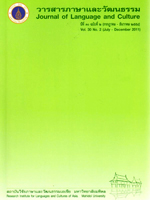Notes on reference time of epistemic modals and their verbal complements in English and Thai
Main Article Content
Abstract
This article discusses essential syntactic and semantic properties of epistemic modals and their verbal complements in English and Thai with respect to tense and aspect. Although in English the epistemic modals themselves lack of future-shift or past-shift of evaluation time, because it is located at present time/tense, we can see a shift of reference time of the verbal complement of the modals. We found that types of aspect, namely situational aspect play a crucial role in specifying the reference time of the verbal complement in English, while this is not the case in Thai. On the other hand, it is the temporal adverbials and the context that help specify the reference time of the epistemic modal complement in Thai. These differences have implications for L2 acquisition of epistemic modals in English by Thai learners of English.
Article Details
How to Cite
Yangklang, P. (2014). Notes on reference time of epistemic modals and their verbal complements in English and Thai. Journal of Language and Culture, 30(2), 23. retrieved from https://so03.tci-thaijo.org/index.php/JLC/article/view/20267
Section
Research Articles
The articles featured in the Journal of Language and Culture (JLC) constitute academic works representing the viewpoints of the respective author(s). It is crucial to note that these opinions do not necessarily reflect those of the Editorial Board.
All articles published in JLC are released under the Creative Commons Attribution 4.0 International License (CC BY 4.0). This license grants permission for unrestricted use, distribution, and reproduction in any medium, provided proper credit is given to the original author(s) and the source.


